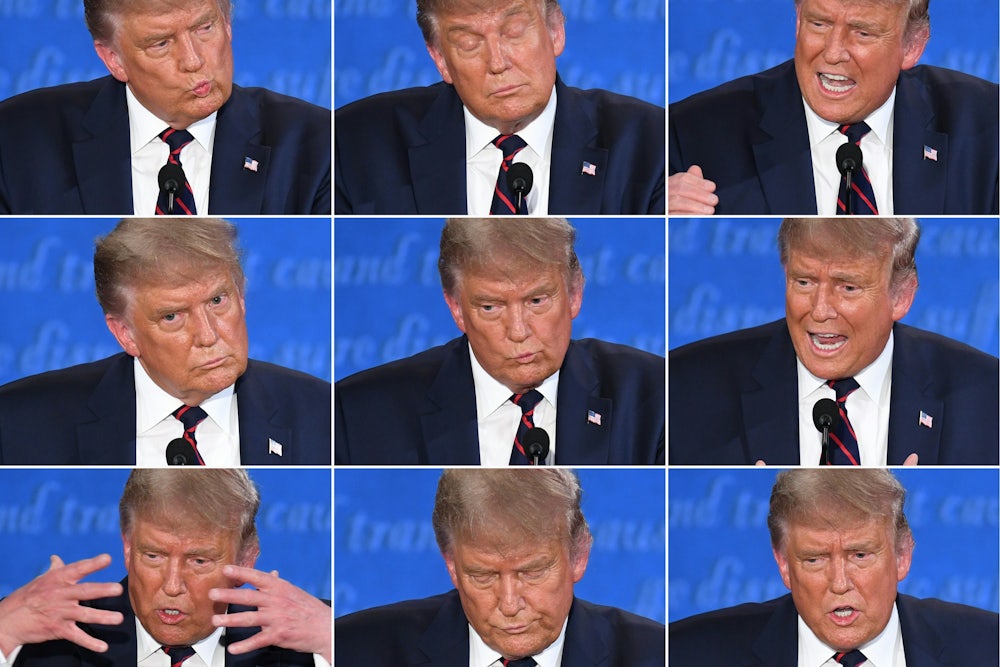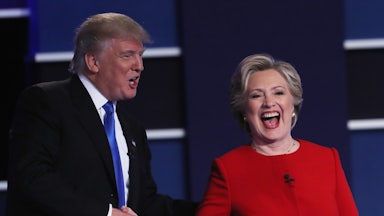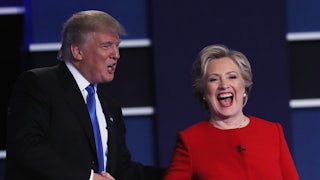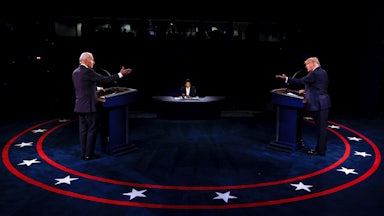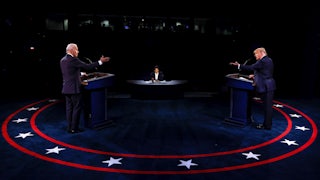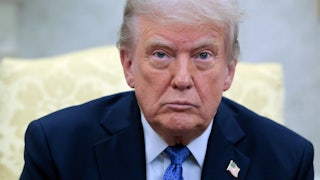The Republican National Committee may have ended the presidential debate as we know it—or presidential debates altogether. In a letter sent Thursday by RNC Chairwoman Ronna McDaniel to the Commission on Presidential Debates—the independent, bipartisan organization that has organized general election debates since the 1988 election—the organization threatened to boycott the quadrennial events during the 2024 election cycle unless the commission was willing to meet a range of demands.
The RNC’s objections to the current way presidential debates are conducted largely mirror those that Republicans have toward the mainstream media in general. Any attempt to fact-check Republicans is seen as evidence of the media’s core liberal leanings—and the fact that Republican candidates tend to spout more falsehoods and lies than their counterparts and are therefore corrected and interrupted more often is then leveled as proof of that bias. These bad-faith arguments are in turn used as proof that the larger political and media establishment is out to get Republicans. Cue the outrage! (And more importantly, send out those fundraising emails—lots and lots of fundraising emails.)
It is an argument without merit. The current presidential debate format—in which moderators are discouraged from interrupting even the wildest statements and in which an appearance of neutrality is privileged over any rigorous application of facts or, for that matter, journalism—is heavily tilted toward Republicans. More to the point, these arrangements serve the interests of cable news: These debates privilege partisan conflict over substantive discussion. They also consistently reward the trivial and superficial over the substantive—the better to manufacture some cheap controversy to fill up the next day of cable news chyrons. While the RNC’s turn against the debates may be seen as part of its larger authoritarian drift, this contretemps over debates largely exists as a distraction from more important anti-democratic actions on the right.
Republicans have been complaining about the level of fact-checking at presidential debates for years, even though it remains dismal by any normal journalistic standard. They first began vehemently objecting after moderator Candy Crowley corrected Mitt Romney during one of 2012’s three debates. But these grievances have accelerated since the rise of Donald Trump: His advisers sparred with the CPD over his desire to seat women who had accused Bill Clinton of sexual harassment and assault near the former president during a debate between Trump and Hillary Clinton.
Four years later, Trump and his advisers fumed about Chris Wallace’s futile attempts to rein in the dumbest and most chaotic debate in history. Trump was ill with Covid-19 at the time, though he apparently covered up a positive test to participate. That illness prompted a change to a virtual debate format for the second debate—a decision that prompted more protests from Trump’s aides and, eventually, the then president backing out altogether.
McDaniel’s efforts to extract concessions from the CPD—or to scrap it altogether in favor of an organization more willing to accept Jesse Watters as a presidential debate moderator—may very well just be yet another instance of Republicans working the refs. The goal, as always, is to get more favorable coverage for the GOP and foist less favorable coverage on Democrats; the goal is never to get factual or truthful coverage of either. In this instance, it’s fairly clear that the RNC doesn’t want moderators fact-checking candidates in real time—one of the very things journalism is designed to do. They have also complained about moderators, particularly those with past ties to Democratic politicians. (In 2020, Steve Scully, then at CSPAN, backed out of hosting one debate after he was caught asking former Trump adviser Anthony Scaramucci’s advice on how to deal with the former president and then lying about it.)
“The RNC has a duty to ensure that its future presidential nominees have the opportunity to debate their opponents on a level playing field,” the letter signed by McDaniel reads. If changes aren’t made, “the RNC will take every step to ensure that future Republican presidential nominees are given that opportunity elsewhere.”
The CPD and Democrats shouldn’t take the bait. The presidential debate system as it is now—with all of its many flaws—is vastly superior to whatever monstrosity McDaniel and other Republicans want to birth into this world. There’s simply no reason to bow to their demands. Let them complain, and give them nothing; it’s likely that within the next two years, they’ll simply accept that the current system, which favors them, is preferable to nothing at all. But if they threaten to take their ball and go home, it’s best to call their bluff.
There are plenty of substantive complaints to be had about the debates. Many argue that we should look to the past, removing the pageantry from the debates and adding more sobriety, as was the case—at least comparably—in many of the handful of debates that took places before the CPD took over. Removing audiences and involving moderators actually interested in engaging with the policies being pushed by the candidates would almost certainly make for more engaging and substantive debates. If the debates themselves are a failure right now, that’s only because they reflect America’s broken political culture. Changing the debates themselves won’t immediately bring about better politics, as some of their critics suggest. It’s better just not to have them at all.
